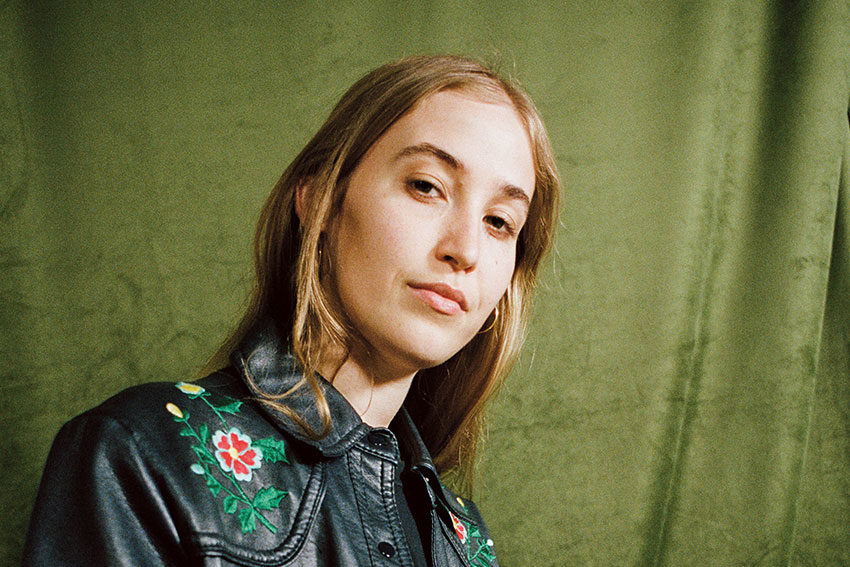Heaven or Brisvegas: Hatchie’s 90s revival

After years spent playing bass in Brisbane garage bands, Harriette Pilbeam found international acclaim with dream-pop solo project Hatchie. As her recent debut album Keepsake takes her around the world, Pilbeam is still coming to terms with the spotlight.
“It’s really weird opening up to people who don’t know you via lyrics, and I’m still figuring it all out,” Pilbeam tells The Adelaide Review.
“Sometimes I don’t write as honestly as I could because I’m so aware of all eyes being on me now that I’m kind of laying all my feelings and thoughts out. It’s a process. I’m not a born front person by any means, so I’m figuring out that part as it goes.”
Pilbeam’s songs are often breezily rhymed catalogues of relationship drama, 20-something insecurity and ennui, couched in washes of guitar and rich vocal harmonies that recall late 90s alternative rock luminaries Cocteau Twins and The Cranberries. Emerging just in time for a recent shoegaze revival, which saw many bands of the era such as Slowdive re-emerge from retirement, the first handful of Hatchie songs soon received attention far beyond the Brisbane music scene.
Pilbeam’s alternative rock credentials received a boost early on when her second single, the jangly singalong Sure, was remixed by Cocteau Twins’ guitarist Robin Guthrie, a full-circle moment given the clear influence of albums like Heaven or Las Vegas on her sound. “It was and still is surreal, as you can imagine,” she says. “It’s been shocking and fulfilling to hear from a bunch of my influences that they’re fans of my music. Over the last year I’ve connected with a lot of my favourite artists through my music and it’s been really touching.”
The approval of such cult icons like is one thing, but the recurring nods to Top 40 pop acts and the occasional splash of 80s dance music sets Keepsake apart from Hatchie’s more obvious influences.
“They’ve all influenced me in different ways, whether it’s my artwork, lyrics, pedals, production or instrumentation,” she says of Keepsake’s pop DNA. “I’m lucky I had phases of listening to super pop music like Kylie Minogue as well as my parents’ favourite 70s and 80s music trickling in throughout my childhood, before moving into darker, alternative music I discovered myself as a teenager and young adult.
“Through each phase I’ve not stopped listening to the music I was previously into; I always cycle through a mass selection of genres, so it’s all ended up meshing together to create my ‘sound’. I don’t have a unique sound at all, but I think it’s a fun blend of pop, shoegaze and post-punk influences.”
Perhaps that is partly generational; notions of genre purity or selling out hold far less cachet than they did in the 90s, especially for people who have always been able to listen to virtually any music, from any period, at any time via Limewire, YouTube or, more recently, Spotify. At the same time, we’ve seen the intellectual discourse and analysis once reserved for ‘serious’ bands extended to pop artists, with a new album by Ariana Grande as worthy of longform essays as one by Thom Yorke. The result is more artists feeling free to play and explore in the margins between genres.
“It’s been really fun cracking open the ways I used to think about and write music,” she says. “I’m trying to get less caught up in planning my sound and more focused on just writing what I feel at the time; so much music over the last 50 years has been essentially made up of traditional pop structures and influences.
I think people have previously just been too cool to admit it. I definitely feel more vulnerable making the music I make now rather than the indie-rock music I was playing written by my friends in my old bands.”
Commensurate to that growing vulnerability has been the size and geographic spread of the crowds Pilbeam performs to, as she and her Hatchie bandmates tour near-endlessly to locations far beyond the Brisbane music scene.
“It’s so different! In Australia I had mainly played shows on weekends and gone back to work and uni during the week,” she says. “International tours require a lot more commitment, mentally and physically. We’re driving for hours on end with not many days off, but it’s so rewarding playing to crowds on the other side of the world! It’s changed my life in so many ways.”
Hatchie
Jive
Saturday 19 October
Tickets
Keepsake is out now